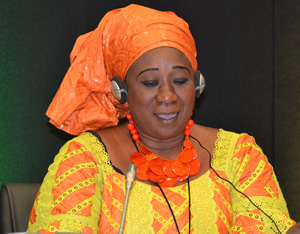NEPAD Spanish Fund beneficiaries share their success stories during AU Gender Summit

During the 2nd High level Panel on Gender Equality and Women’s Empowerment, the NEPAD Spanish Fund gave various beneficiaries the center stage to share their own success stories and to learn from other projects.
There was Mr Edward Koloviko, who spoke on behalf of Young Enterprise Malawi, an NGO in Malawi which received funding from the NEPAD Spanish Fund. Through the support, Young Enterprise was able to build one hostel each at two vocational training centers - Evangelical Church of Malawi Vocational Training Institute and Stephanos Vocational Training Centre. The hostels now house 48 young girls who had previously struggled with accommodation and had to travel long distances daily to attend their classes.
“The lives of Malawian girls have improved, thanks to the NEPAD Spanish fund for Women Empowerment”, Mr Koloviko said.
Mrs Asta Diagaby Ba highlighted the success storiy of PANALE, Produits Africains Normalisé Accessibles pour le Développement Local et Environnemental. Based in Senegal, PANALE comprises of2500 women in urban areas and 104 500 women in rural areas. “We support women to produce market ready products for 7 shops and supermarkets in Dakar, Germany and the US”. As part of the project, women were trained on marketing, quality assurance, ICT and business management. The Funding also helped PANALE to build a storage mill and to modernise businesses of the women so as to increase their productivity. “Through the project 107 000 women in Senegal are economically empowered today and can support the livelihoods of their family”, she said.


Asta Diagaby Ba and Edward Koloviko
Mrs Aissata Touré of Coordination des Femmes Entrepreneurs du Mali (CFEMA) briefed the delegates on how the funding from the Spanish Fund was used for the improvement of women’s livelihoods. Her organisation received 368,120 Euros, of which 80% was funded by NEPAD and 20% by the government. “We aim to build capacities of women entrepreneurs in Mali. The project ran for 18 months and impacted 1101 women from sectors such as trading, agro processing and ICT. In order to impact the whole country, 8 fully equipped regional centres were opened. The project supported 240 women to start up viable businesses, which are still running profitably. 240 women were also trained in business management, 250 in information communication technology, 260 leadership and 240 in makerting and accounting. Today, the project has gone beyond impacting women in urban areas and has impacted 2750 rural women”, she said.
Another organisation that benefitted is Sudan Peace and Education Development Programme (SPEDP) in South Sudan. Harriet Tosquine, the Gender Programme Officer representing the organisation indicated that they received funding from the NEPAD Spanish Fund to empower women through vegetable and fruit production in the two states of South Sudan – Morobo and Magwi county. The organisation is now able to train women in agronomic practices and marketing. Two market sheds were constructed in the two locations to enable women to sell their products. They also linked the women to other nearby markets by helping them transport their goods and assist in determining pricing standards. In addition, business skills’ training is provided in order for the women to conduct their enterprises successfully. Mrs Tosqhine also highlighted that there is now an increased level of literacy, “this has also led to a high level of school enrolment and retention – all due to the income generating activities provided by SPEDP through the NEPAD Spanish Fund”, she said.


Harriet Tosquine and Ebrima Ganno
“My name is Ebrima Ganno. I am the Acting Executive Director for Gambia Women’s Finance Association (GAWFA). We received funding from the NEPAD Spanish Fund with the objective of providing access to affordable, reliable and timely financial services at the doorstep of women, especially in rural areas. With the funding we received, we started an initiative called “Mobile banking”. Women are now using mobile banking to have faster access to loans, micro-credit and other financial services. The fast delivery of the mobile banking system has made it easier for women to get access to money and loans irrespective of their location and it has led to easier conduct of business without the usual hurdles. The technology is bio-metric which makes the banking system transparent and beneficiaries can also easily track their financial transactions. Easier access to finance has empowered Gambian women, even in rural areas. Women can now expand their businesses and start news business as well. The NEPAD Spanish fund has brought technology to the doorstep of our women.”
